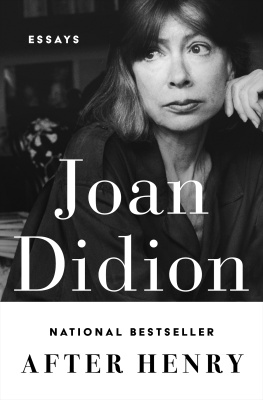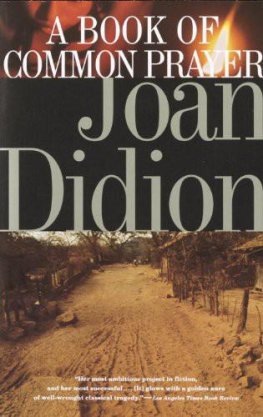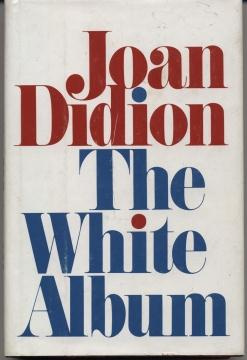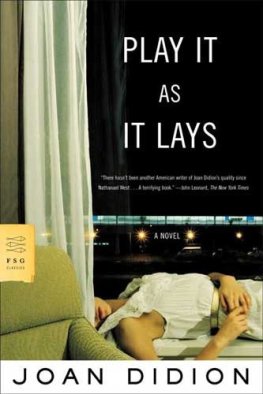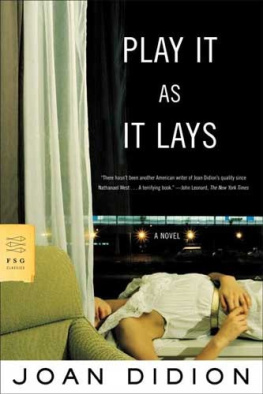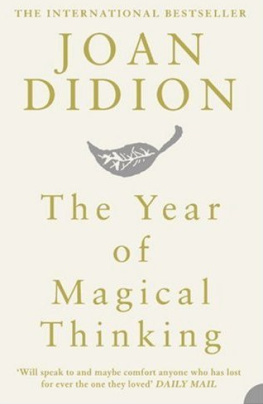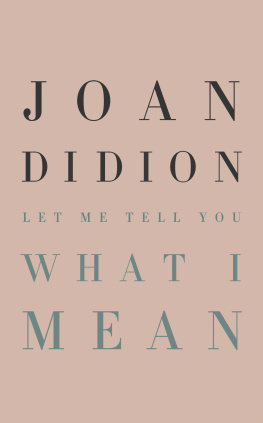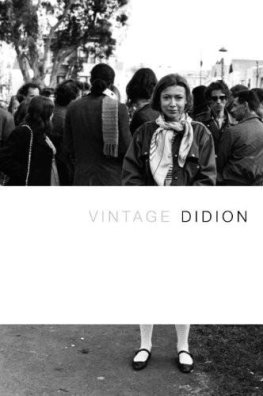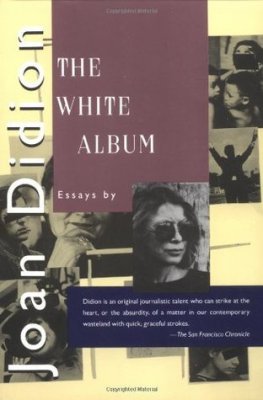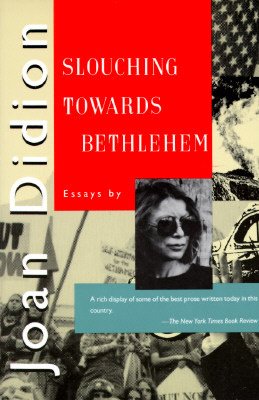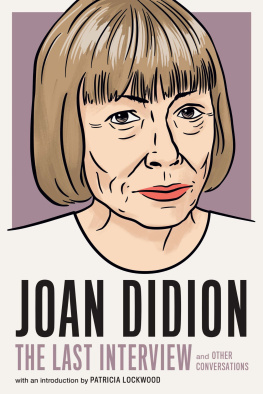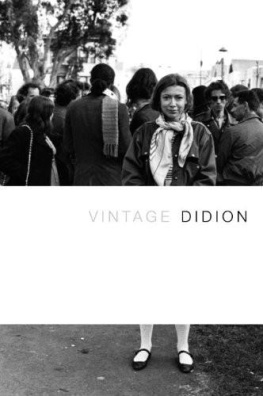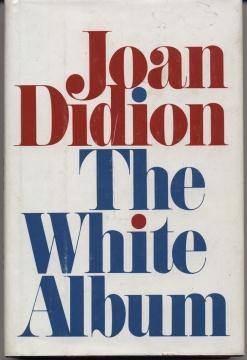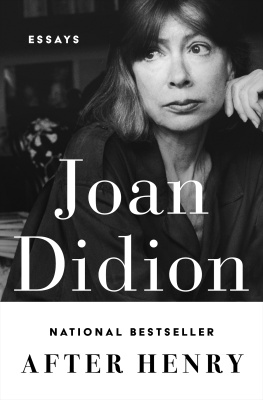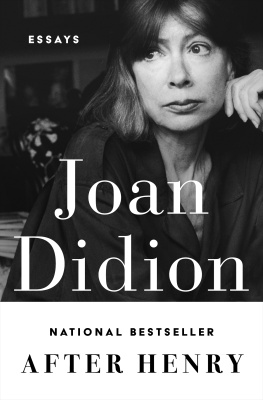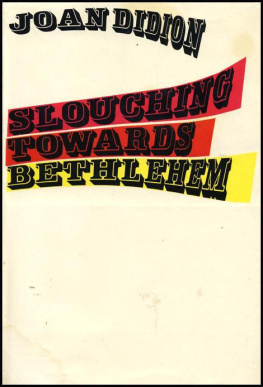After
Henry
Joan
Didion

Acknowledgments
In the Realm of the Fisher King, Insider Baseball, Shooters Inc., Girl of the Golden West, and Sentimental Journeys appeared originally in The New York Review of Books. Los Angeles Days, Down at City Hall, L.A. Noir , Fire Season, Times Mirror Square, and part of Pacific Distances appeared originally as Letters from Los Angeles in The New Yorker. Most of Pacific Distances and the introductory piece, After Henry, appeared originally in New West, which later became California and eventually folded. I would like to thank my editors at all three magazines, Jon Carroll at New West, Robert Gottlieb at The New Yorker, and most especially, since he has put up with me over nineteen years and through many long and eccentric projects, Robert Silvers at The New York Review.
This book is dedicated to Henry Robbins and to Bret Easton Ellis, each of whom did time with its publisher.
Contents
After Henry
In the summer of 1966 I was living in a borrowed house in Brentwood, and had a new baby. I had published one book, three years before. My husband was writing his first. Our daybook for those months shows no income at all for April, $305.06 for May, none for June, and, for July, $5.29, a dividend on our single capital asset, fifty shares of Transamerica stock left to me by my grandmother. This 1966 daybook shows laundry lists and appointments with pediatricians. It shows sixty christening presents received and sixty thank-you notes written, shows the summer sale at Saks and the attempt to retrieve a fifteen-dollar deposit from Southern Counties Gas, but it does not show the date in June on which we first met Henry Robbins.
This seems to me now a peculiar and poignant omission, and one that suggests the particular fractures that new babies and borrowed houses can cause in the moods of people who live largely by their wits. Henry Robbins was until that June night in 1966 an abstract to us, another New York editor, a stranger at Farrar, Straus & Giroux who had called or written and said that he was coming to California to see some writers. I thought so little of myself as a writer that summer that I was obscurely ashamed to go to dinner with still another editor, ashamed to sit down again and discuss this work I was not doing, but in the end I did go: in the end I put on a black silk dress and went with my husband to the Bistro in Beverly Hills and met Henry Robbins and began, right away, to laugh. The three of us laughed until two in the morning, when we were no longer at the Bistro but at the Daisy, listening over and over to In the Midnight Hour and Softly As I Leave You and to one anothers funny, brilliant, enchanting voices, voices that transcended lost laundry and babysitters and prospects of $5.29, voices full of promise, writers voices.
In short we got drunk together, and before the summer was out Henry Robbins had signed contracts with each of us, and, from that summer in 1966 until the summer of 1979, very few weeks passed during which one or the other of us did not talk to Henry Robbins about something which was amusing us or interesting us or worrying us, about our hopes and about our doubts, about work and love and money and gossip; about our news, good or bad. On the July morning in 1979 when we got word from New York that Henry Robbins had died on his way to work a few hours before, had fallen dead, age fifty-one, to the floor of the 14th Street subway station, there was only one person I wanted to talk to about it, and that one person was Henry.
Childhood is the kingdom where nobody dies is a line, from the poem by Edna St. Vincent Millay, that has stuck in my mind ever since I first read it, when I was in fact a child and nobody died. Of course people did die, but they were either very old or died unusual deaths, died while rafting on the Stanislaus or loading a shotgun or doing 95 drunk: death was construed as either a blessing or an exceptional case, the dramatic instance on which someone elses (never our own) story turned. Illness, in that kingdom where I and most people I knew lingered long past childhood, proved self-limiting. Fever of unknown etiology signaled only the indulgence of a week in bed. Chest pains, investigated, revealed hypochondria.
As time passed it occurred to many of us that our benign experience was less than general, that we had been to date blessed or charmed or plain lucky, players on a good roll, but by that time we were busy: caught up in days that seemed too full, too various, too crowded with friends and obligations and children, dinner parties and deadlines, commitments and overcommitments. You cant imagine how it is when everyone you know is gone, someone I knew who was old would say to me, and I would nod, uncomprehending, yes I can, I can imagine; would even think, God forgive me, that there must be a certain peace in outliving all debts and claims, in being known to no one, floating free. I believed that days would be too full forever, too crowded with friends there was no time to see. I believed, by way of contemplating the future, that we would all be around for one anothers funerals. I was wrong. I had failed to imagine, I had not understood. Here was the way it was going to be: I would be around for Henrys funeral, but he was not going to be around for mine.
The funeral was not actually a funeral but a memorial service, in the prevailing way, an occasion for all of us to meet on a tropical August New York morning in the auditorium of the Society for Ethical Culture at 64th and Central Park West. A truism about working with language is that other peoples arrangements of words are always crowding in on ones actual experience, and this morning in New York was no exception. Abide with me: do not go away was a line I kept hearing, unspoken, all through the service; my husband was speaking, and half a dozen other writers and publishers who had been close to Henry RobbinsWilfrid Sheed, Donald Barthelme, John Irving, Doris Grumbach; Robert Giroux from Farrar, Straus & Giroux; John Macrae from Duttonbut the undersongs I heard were fragments of a poem by Delmore Schwartz, dead thirteen years, the casualty of another New York summer. Abide with me: do not go away, and then:
Controlling our pace before we get old,
Walking together on the receding road,
Like Chaplin and his orphan sister.
Five years before, Henry had left Farrar, Straus for Simon and Schuster, and I had gone with him. Two years after that he had left Simon and Schuster and gone to Dutton. This time I had not gone with him, had stayed where my contract was, and yet I remained Henrys orphan sister, Henrys writer. I remember that he worried from time to time about whether we had enough money, and that he would sometimes, with difficulty, ask us if we needed some. I remember that he did not like the title Play It As It Lays and I remember railing at him on the telephone from a hotel room in Chicago because my husbands novel True Confessions was not yet in the window at Krochs & Brentanos and I remember a Halloween night in New York in 1970 when our children went trick-or-treating together in the building on West 86th Street in which Henry and his wife and their two children then lived. I remember that this apartment on West 86th Street had white curtains, and that on one hot summer evening we all sat there and ate chicken in tarragon aspic and watched the curtains lift and move in the air off the river and our world seemed one of considerable promise.

